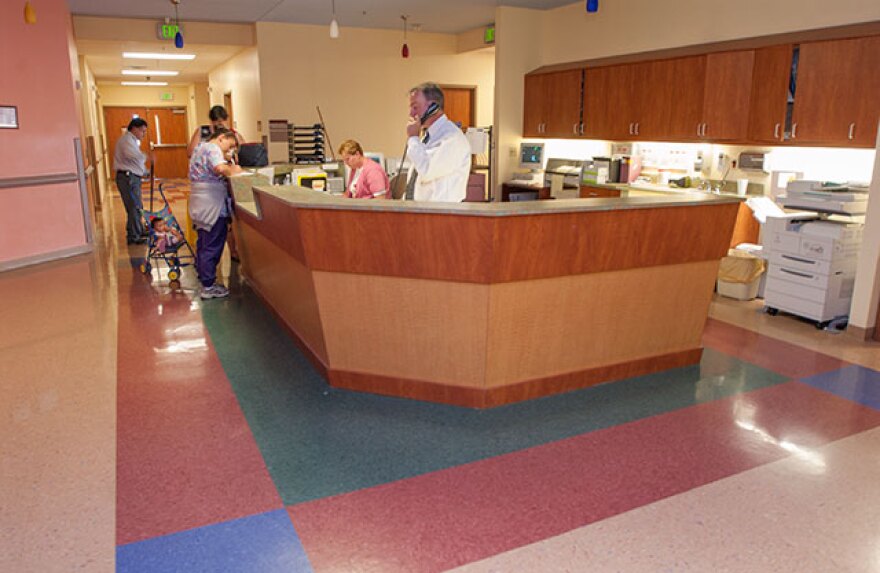In the Big Bend region, healthcare officials say there have been 32 coronavirus tests conducted so far — 23 test results have come back negative, while 9 are still pending.
Local officials have largely been reluctant to release testing numbers, citing federal patient privacy laws. But, Dr. Ekta Escovar with Big Bend Regional Medical Center, told Brewster County Commissioners on Wednesday that the pool of tests conducted so far is large enough that officials can release information without violating patient privacy.
"We don’t have the capability to test everybody, so the fact that people are abiding by social distancing rules and shelter in place, it’s allowing folks who may have milder cases of COVID to let the infection stay with them and they’re not contributing to the spread," said Dr. Escovar, who has been giving coronavirus briefings to local authorities.
With 32 tests conducted, Escovar says that means the test rate for the tri-county area is 1.7 people tested for every 1,000. Across the state, that figure is closer to 3 for every 1,000, according to Escovar.
"I know 32 tests doesn't sound like a lot, but when you divide it by the population we're serving, we're actually not doing bad at all," said Escovar.
As of Tuesday, there have been zero confirmed cases of COVID-19 in the Big Bend region. The closest confirmed cases of coronavirus in the area are in Pecos County, where a 54-year-old woman tested positive over the weekend, and in Ojinaga, across the border from Presidio.
While local medical providers don't have the capability to run tests and get results locally, Alpine’s hospital and area clinics are able to swab a limited number of patients and send samples off to a private or public lab for results. Since March, local healthcare professionals have said they're limiting swab tests for serious cases.
Dr. Escovar estimates it's taking between seven and 10 days for test results to come back.
When a patient is tested for coronavirus, Dr. Escovar says they're strongly encouraged to self-quarantine if they haven't been doing so already. She said, if a patient receives a negative result, it's still important for them to practice social distancing and preventative measures.
"There's a 30 percent false-negative rate [with coronavirus testing], so just because you have the right symptoms with COVID and the test comes back negative, we still may advise you to stay in self-quarantine."
A ‘Surge Plan’ For The Big Bend
In early March, healthcare professionals across the region—including doctors with Big Regional Medical Center and physicians at clinics with Preventative Care Health Services, which has locations in Marfa, Presidio and Alpine — created a task force to stay current with the latest data on the coronavirus, as well as updated practices for screening and triage.
That task force—which meets multiple times every week to go over how the area could respond to severe cases of COVID-19—has since created what they're calling a "surge plan" should the area see growing numbers of coronavirus patients.
Officials are now disclosing to the public the basic details of that plan, but are declining to reveal the full breadth of operations.
If the region begins to see a surge of potential COVID-19 patients in the Big Bend area, Dr. Escovar says clinics will first close their doors. Many have already stopped taking walk-in patients.
From there, a centralized hotline, operated by clinicians, would be set up. Patients would be screened over the phone and directed to either a non-respiratory clinic or a respiratory clinic. The idea is to send patients needing routine care from a physician to a "non-respiratory clinic" in either Alpine, Fort Davis, Marfa or Presidio. Under the plan, all of the clinics in Alpine would merge into a single, non-respiratory clinic and operate out of one specific location.
Officials would set up a single respiratory clinic inside Big Bend Regional Medical Center. Any patient suspected of having the coronavirus would be directed there.
“In order to make it the safest for everybody, we have one respiratory clinic," said Dr. Escovar.
According to Escovar, creating a single site where coronavirus patients are treated would also allow the hospital to maximize the use of personal protective equipment, which has seen increasing demand across the country as hospitals treat more and more coronavirus cases.
If doctors and nurses are only responding to coronavirus patients, then they wouldn’t need to change out of their PPE gowns and masks—something that would happen if they needed to see a patient that doesn’t have the coronavirus.
Should the area see severe cases of COVID-19 in the future, Big Bend Regional Medical Center has two ICU beds and two ventilators to support and stabilize critical patients until they can be transported to a larger hospital. At this time, the area’s regional center for severely ill patients is in El Paso.
Dr. Escovar says if El Paso’s hospital beds are maxed out, the regional task force would look into a lateral exchange transfer, something Dr. Escovar says is already being practiced in some of the harder hit coronavirus areas like New York.
A lateral transfer would see more severe cases from the Big Bend sent to El Paso, while health officials there would send patients with milder symptoms to the Big Bend.

